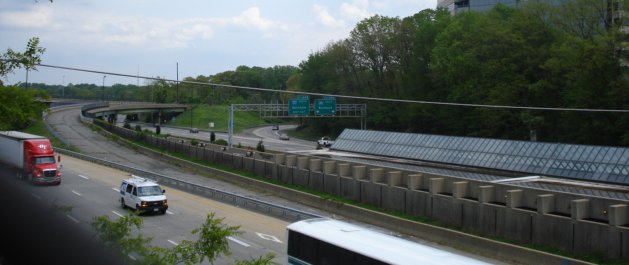
Above is the interchage at 495 and 66 – Richmond or Baltimore. That building in the middle is the Dunn Loring Metro Station, so you get to see several parts of the transit puzzle.
They are building “hot lanes” on I-495 near my house. Hot lanes are special lanes where people pay a premium to drive. The price is based on the traffic conditions. When there is a lot of traffic, the price is higher. This means that people choose to trade time for money and travel time is more predictable.
We need to address traffic congestion and building more or wider roads won’t work. Charging for use based on demand makes so much sense. Currently we allocate space on the road by making people wait in line. It is the same way the Soviet Union distributed bread with the same result.
I am interested in these kinds of innovative traffic solutions, so I went down to the Virginia Dept of Transportation (VDOT) information session at Luther Jackson Middle School not far from my house. There were around 200 people at the meeting. The most boisterous among them (us) expressed outrage at the hot lanes. Nobody wants any new roads in his neighborhood and people complained that hot lanes were just ways to let the rich avoid traffic.
It is a challenge of direct democracy. We experienced the same sort of thing in New Hampshire. Our community wanted to put in a sewer system, but some of the old guys figured out (correctly) that they would not live long enough to justify the initial investment, so old Mr. Parker or old Mrs. Winthrop got up and complained. Nobody wanted to cross them, so nothing happened. Some of my neighbors at the VDOT meeting wanted to stop this project. Fortunately, the VDOT people are made of sterner stuff, or maybe they don’t care as much re public attitudes. Hot Lanes WILL be built in N. Virginia. There are already hot lanes on I-394 in Minneapolis, I-25 in Denver, SR-91 in Orange County, I-15 in San Diego & I-10 in Houston, Texas, but Virginia’s is evidently going to be the biggest private-public partnership for hot lanes in the world. Read more about Virginia hot lanes at this link.
Actually, I am not sure what the real attitude of my fellow Virginians is re hot lanes. The loudest people complained loudly and used the pronoun “we” very liberally. After the meeting, I talked to some people who seemed less opposed. Nobody likes a new road in their yard, but many people are reasonable and understand that this particular project is good.
It reminds me of the old joke. The Lone Ranger & Tonto are fighting a group of Indians and losing. The Lone Ranger says, “It looks like we are surrounded, Tonto.” Tonto replies, “What is this ‘we’ Kemosabi?”
Chrissy attended a similar meeting at the same time I was doing the hot lanes. Hers was re new buildings near the metro. We (CJ and I) favor density near the metro. It is good for the environment and good for our community, but current residents are often against it. They want to shut the door behind themselves.
Our views on development generally make Chrissy and me as popular as skunks at a garden party, at least among the activists who just assume the local residents will toe the anti-development line. But I think we are doing the right thing. Greater density near the metro and hot lanes are solutions that address the problems of traffic and congestion. Developing where we are means saving farms and forests farther away and helps use all that expensive infrastructure. The alternative, just opposing change, solves no problems, although it might make our lives temporarily easier. But it is sort of like the Mr. Parker or Mrs. Winthrop attitude.
